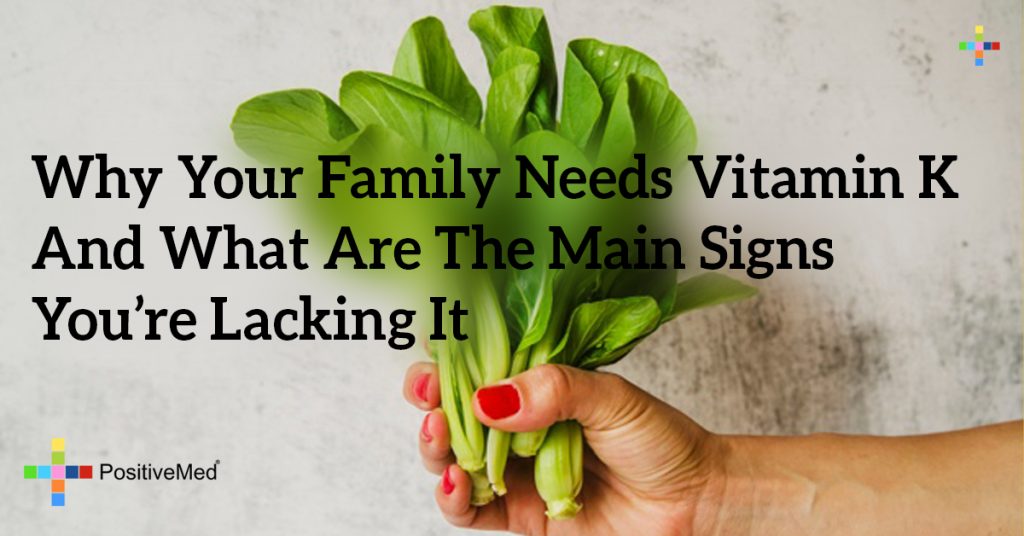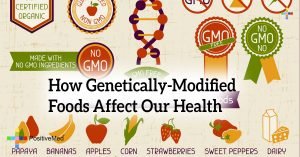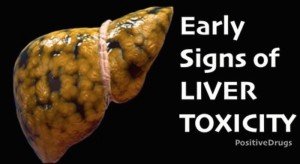
Why Your Family Needs Vitamin K And What Are The Main Signs You’re Lacking It
[nextpage title=”…”]
Vitamin K is an essential vitamin that can be found in leafy vegetables. It comes in several forms, and two of them can be obtained in the United States. K1 is the most popular form, because it is stronger and works faster. It also is not as toxic as K2. Vitamin K3 is artificial.

Why You Need Vitamin K Daily
The primary benefit of vitamin K is that it helps the blood to clot. Patients may also be given supplemental vitamin K when taking certain medications that cause bleeding, such as quinine, quinidine, salicylates, sulfonamides, and antibiotics. People who are on dialysis may also be given vitamin K to help reduce cholesterol.
Like most vitamins, it is necessary to help prevent a variety of diseases. When there are sufficient amounts of vitamin K, it can help to prevent the following:
• Arterial calcification
• Cardiovascular disease
• Varicose veins
• Osteoporosis
• Dementia
• Prostate cancer
• Lung cancer
• Liver cancer
• Leukemia
• Pneumonia
RELATED ARTICLE: 9 Worst Signs Of Calcium Deficiency And What Is Your Adequate Amount Of Calcium
Vitamin K can also be applied directly to the skin. Many people use it to eradicate issues like rosacea, spider veins, bruises, scars, and stretch marks. It is often also applied directly to surgery sites to speed up healing. An injection of vitamin K may be given to prevent clotting.
Signs and Symptoms of Vitamin K Deficiency
Not having enough vitamin K will be evidenced in several ways. Problems may include one or more of the following:
• Anemia
• Bruising
• Severe aortic calcification
• Heavy menstrual bleeding
• Osteoporosis
• Coronary heart disease
• Gastrointestinal bleeding
Most Americans will get enough vitamin K in their diet. Those who are more apt to have a deficiency include alcoholics, people with liver disease, and those with gastrointestinal problems, such as those with colitis, cystic fibrosis, and Crohn’s disease. People who take antibiotics over a prolonged period may also have reduced levels of vitamin K, because some of the body’s needs for the vitamin is produced in the intestines. Taking aspirin over long periods can also reduce vitamin K intake levels.
Foods That Are High in Vitamin K
Healthy eating will normally provide a good amount of vitamin K in the diet, which should be about 90 mcg per day for women, and about 120 for me, according to the National Institute for Health. Vegetables are the primary source of the vitamin and the highest levels are found in kale (1,147 mcg per cooked half cup), spinach (988 mcg per cooked half cup), and collards (1,059 mcg per cooked half cup).
[/nextpage] [nextpage title=”…”]
It can also be found in:
Other Vegetables:
• asparagus (144 mcg per 4 spears)
• broccoli (220 mcg per cup, cooked)
• mustard greens (830 mcg per cup, cooked)
• turnip greens (529 mcg per cup, cooked)
• cabbage (163 mcg per cup, cooked)
• brussel sprouts (219 mcg per cup, cooked).
Beans and soybeans
Fruit:
• Strawberries (2.2 mcg per berry)
• Avocado (21 mcg
• Grapes (22 mcg per cup, raw)
• Prunes (28 mcg per 5 prunes)
• Kiwifruit (28 mcg per fruit)
Meat:
• lamb (5.3 mcg per 3.5 ozs.)
• duck (3.8 mcg per 3.5 ozs.)
• beef liver (3.9 mcg per 3.5 ozs.)
In order to get the most benefit from vitamin K in the foods you eat, you need to eat some fat with it.
Warning Signs of Vitamin K Deficiency
Vitamin K is certainly one of the most important vitamins necessary for good health. As you can see from the above lists of problems caused by deficiencies, a lack of it affects a wide range of problems – and all of them are serious. Vitamin K is also necessary to complete the process of changing some proteins into biologically active (useful) ones, say vitamins-supplements.org.
The human body only stores a couple of days’ worth of the vitamin, so a constant supply is needed. While many people do get enough vitamin D to cause sufficient clotting, there is not enough to help prevent some of the other potential issues. Vitamin D is also important for the body’s proper utilization of vitamin K. Each one is essential for the body to be able to efficiently use the other one.
The Importance of Vitamin K for Kids and Old People
According to the University of Maryland Medical Center, when newborns are born, a shot of vitamin K is often given by injection. Children need vitamin K because of their frequent falls, and the elderly need it because of various health problems.
People who are on blood thinners need to consult their doctor about how much vitamin K they should take. Some other medications may also negate the effects of the vitamin, or vice versa.
Conclusion
Vitamin K is often lacking in many people’s diets today. It can be supplemented easily, and taking vitamin K2 is probably the best form.
[/nextpage]







